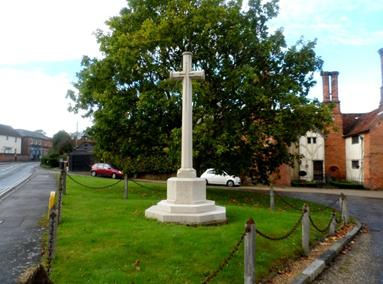
Ernest
CLARK
1880 - 1916

Early Life
ERNEST CLARK (sometimes spelt with an E) was born on the 17th June 1880 in Great Waltham, Essex, the second son of Walter and Eliza Clarke (née Wakeling). His parents were married on the 23rd September 1876 in the Parish Church, Great Waltham. Walter was a Labourer and Eliza, a servant.

MARRIAGE WALTER CLARK & ELIZA WAKELING

WALTER AND ELIZA CLARK

BAPTISM ERNEST CLARK
Ernest was baptised on the 1st August 1880 in the Parish Church, Great Waltham. His elder brother Frederick, born in 1878, died when he was 11 months old in May 1879. There followed three more sons for Walter & Eliza, Herbert, b. Feb 1883, Charles, b.1885 and David b. in 1890.
In 1891 The Census shows the family living at Bredes (Breeds), Walter was working as an Agricultural Labourer and Ernest was a Scholar at the village school, as were his two younger brothers.
By 1901 the Census shows the family living at Broads Green. Walter and Herbert, his son, were ordinary Agricultual Labourers. Ernest was employed a Domestic Gardener at Wallops, Great Waltham and David, a Domestic House Boy.
When Ernest was 26 years old he married Laura Hornsby, aged 23 years, in the Parish Church, Great Waltham on the 22 September 1906.

MARRIAGE OF ERNEST CLARK AND LAURA HORNSBY

WEDDING DAY

Ernest with his wife Laura and daughter Dorothy in 1916
The couple lived at Laburnum Cottage, Broads Green and on the 24th May 1909, their only daughter, Dorothy Victoria Clark was born. She was baptised on the 11th July 1909 in the Parish Church.

BAPTISM DOROTHY VICTORIA 11 JULY 1909
Military Life
In January 1916 the Military Service Act was introduced by the Prime Minister, H Asquith and came into force on the 2nd March. The Act specified that men from 18 to 41 years old were liable to be called up for service in the army unless they were married, widowed with children, serving in the Royal Navy, a minister of religion, or working in one of a number of reserved occupations. A second Act on the 25th May 1916 extended liability for military service to married men, and a third Act in 1918 extended the upper age limit to 51.
Ernest enlisted at Chelmsford with the 1st Battalion, Essex Regiment as a private, Regiment No. 30364. The Regiment formed part of the 88th Brigade in the 29th Division. The Battalion took its place on the Western Front in April 1916 and from July 1916 until November 1916 it participated in the Battle of The Somme. He went in September to the Western Front after training at Felixstowe.
Because of his age – 35 years, he was promoted to the rank of non-commissioned Officer Lance-Corporal within his platoon, with his Platoon Sergeant stating that ‘Ernest was one of his best officers. As a soldier and a man he was great. As an NCO, he was of very great assistance to the Sergeant in managing the platoon – No. 4.’

LANCE CORPORAL ERNEST CLARK
Death and Memorial
On the 21 November 1916, the Battalion took over the Front Line at Le Boeufs on the Somme battlefield from the Worcestershire Regiment. Ernest wrote a letter to his wife and daughter this day saying how very cold it was in France and thanking them for their letters, gifts and paper.
On the 22nd November Ernest was in the support trenches on the Front Line and was hit by a piece of shell in the thigh at about 3.30 pm, he lost consciousness and lived for about three quarters of an hour. He was with stretcher bearers when he died. His body was never recovered from the battlefield and he has no known grave.

Ernest is ‘Remembered with Honour’ on the Thiepval Memorial, designed by Sir Edwin Lutyens, and built between 1928 and 1932. The Memorial was unveiled on the 1st August 1932, by the Prince of Wales. The Thiepval Memorial is on the D73, next to the village of Thiepval, off the main Bapaume to Albert road (D929) in the Somme, France.
Ernest is remembered on the Pier Face 10D.

Ernest is also remembered on the Chelmsford Civic Centre War Memorial within the Civic Centre.
The Memorial panels are on the landing wall above the entrance to the Civic Centre.


Ernest is remembered in his home village on the Great Waltham War Memorial.

UK, Army Registers of Soldiers' Effects, 1901-1929
On the 23rd March 1917 his widow, Laura received £1.9s.8d and on the 13th October 1919 a further Gratuity payment of £3 was paid to her.

'DEATH PENNY' ERNEST CLARK
Ernest was awarded the British War Medal and the Victory Medal.

MEDAL CARD


